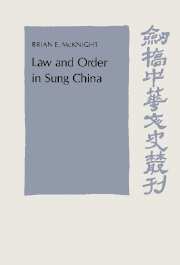Book contents
- Frontmatter
- Contents
- List of figures, maps, and tables
- Preface
- List of abbreviations
- 1 Introduction
- 2 The historical context
- 3 Crimes and criminals
- 4 Informal and semiformal agencies of law enforcement
- 5 Formal civil agencies of law enforcement
- 6 The role of the military in law enforcement
- 7 Supervision of law enforcement – the role of the intendants
- 8 Personnel selection
- 9 Urban crime and urban security
- 10 The Sung penal system
- 11 Jails and jailers in the Sung
- 12 Penal registration
- 13 The death penalty
- 14 Modifications of penalties
- 15 Conclusion
- Glossary
- Bibliography
- Index
15 - Conclusion
Published online by Cambridge University Press: 23 December 2009
- Frontmatter
- Contents
- List of figures, maps, and tables
- Preface
- List of abbreviations
- 1 Introduction
- 2 The historical context
- 3 Crimes and criminals
- 4 Informal and semiformal agencies of law enforcement
- 5 Formal civil agencies of law enforcement
- 6 The role of the military in law enforcement
- 7 Supervision of law enforcement – the role of the intendants
- 8 Personnel selection
- 9 Urban crime and urban security
- 10 The Sung penal system
- 11 Jails and jailers in the Sung
- 12 Penal registration
- 13 The death penalty
- 14 Modifications of penalties
- 15 Conclusion
- Glossary
- Bibliography
- Index
Summary
The inevitable tensions between the incommensurable goals and desires of different groups and individuals is a part of the dynamic core of any society. These tensions work themselves out in a context of geography, technology, economy, and tradition that shape the choices that the groups and individuals in the society think that they have. Disparities of values and circumstances, of patterns of action and experience, and of expectations and understandings are sources of social energy; the institutions, practices, beliefs, and patterns of living that emerge from the interaction of all these factors are determined by both the actions of the people involved and the world – physical, mental, cultural, and social – within which they live and act. In successful societies these tensions produce a healthy balance of interests, which makes it possible for many members of the society to lead reasonably secure and fulfilling lives.
Such social tensions play this central role even in the simplest societies; in states with a ruling elite, a new dimension is added to the interplay of social tensions. While recognizing that their views and visions are not shared by all others in the society, ruling elites are usually capable of identifying their own views with the “proper” views. By so doing, they define other views as deviant. These elites have the power to define certain violations as crimes, to which they can legitimately respond with force. Ruling elites can identify their own values with proper values because in fact on many points they are in agreement with large segments of the societies they control.
- Type
- Chapter
- Information
- Law and Order in Sung China , pp. 507 - 523Publisher: Cambridge University PressPrint publication year: 1992



